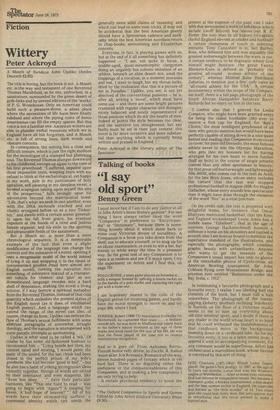Wittery
Peter Ackroyd
A Month of Sundays John Updike (Andre Deutsch £2.95) The title is boring, but the book is not. A Month etc. is the way and testament of one Reverend Thomas Marshfield, as he sits, unfrocked, in a sanatorium, surrounded by the green desert of golk-links and by unread editions of the 'works' of P. G. Wodehouse. Only an American could build such a pleasure-dome, a silent place where the necessities of life have been finally subdued and where the piping voice of homo Americanus can fill the empty spaces. But this voice is not a familiar one. American writers are able to plunder verbal resources which we in England have all but forgotten, and A Month etc. is full of strong lines, dark words and obscure conceits.
In consequence, the writing has a close and difficult texture, which is just the right medium for the monologue of a cramped but glistening soul. The Reverend Thomas plunges downward to his childhood, swoops up again to the time of his first priesthood: "I suffered, impaled upon those impossible texts, weeping tears with my refusal to blink at the eschatological, yet happy in my work, pale in my pantomime of holy agitation, self-pleasing in my sleepless sweat, a fevered scapegoat taking upon myself the sins of the prosperous," falls lovingly upon his adventures beyond the matrimonial bond: "Life, that's what we seek in one another, even with the DNA molecule cracked and our vitality arraigned before us as a tiny Tinkertoy," and dwells with a certain scenic generality upon his fall from grace, his eventual exposure at the hands of a tired and jealous female organist, and his exile to the sporting and pleasurable fields of the sanatorium. But A Month etc. is more than a mere chronological sequence. It is a memorable example of the fact that even a slight modification of the language can change the context and the substance of a novel, opening it onto a recognisable model of the world instead of tying it up and wrapping it in the tinsel of consumerised goodies (read here almost any English novel), turning the narrative into something of substance instead of a transparent vehicle for 'themes' and 'plot' as our domesticated language recedes into a hard shell of denotation, making the novel a living witness, if I may borrow a spiritual metaphor from the Reverend Thomas, instead of that cold quantity which embodies the present status of the English novel (as it does of established English poetry). And a language which can extend the range of the novel can also, of course, change its form; Updike can enliven the flow of Thomas's sexual fulfillment with some abstruse paragraphs of somewhat straight theology, and the narrative is interspersed with some parodic attempts at sermonising.
Updike is what used to be called a 'wit.' Of course he has some old-fashioned humour to recommend him — "Lying beside her then, my consort sated and snoring, I would panic the panic of the sealed, for the last chink had been closed in the perfect prison of my wife's goodness. She had become 'good in bed'."—but he also has a habit of yoking incongruous ideas violently together. Strings of words are united by their assonance, and even misprints, like "Aven less sleep . . .", have their particolar footnote, like "This one hard to read — was going to begin with 'Again'? A longing for haven. A half-hope of heaven?' ". All of his words have their shimmering surface, a communal .identity which can usurp the generally more solid claims of 'meaning' and which can lead to some neat tricks. It may not be accidental that the best American poetry should have a Spenserian cadence and authority while the best American novelists return to chap-books, sermonising and Elizabethan conceits.
Everyone, in fact, is playing games with us, but at the end of it all something has definitely happened — "I see, not quite in focus, a middle-aged, quasi-mesomorphic clergyman doing an ungainly but solemn imitation of an athlete, beneath an alien desert sun, amid the trappings of a vocation, in a moment inocuous and lost. I want to laugh, but my throat locks, dried by the realisation that this is a picture of me in Paradise." Updike, you see, is not yet absolved of the conventional passions — he is, after all, writing a 'novel', which must have some use — and there are some bright pictures crammed with regular character and dialogue, nicely balanced and nicely representative of those passions which do stir the hearts of men. Indeed at 'points the style becomes too clear, and the narrative too straightened, but any faults must be set in their just context: this novel is far more inventive and more substantial than anything which is currently being written and praised in England.
Peter Ackroyd is the literary editor of The Spectator


































 Previous page
Previous page